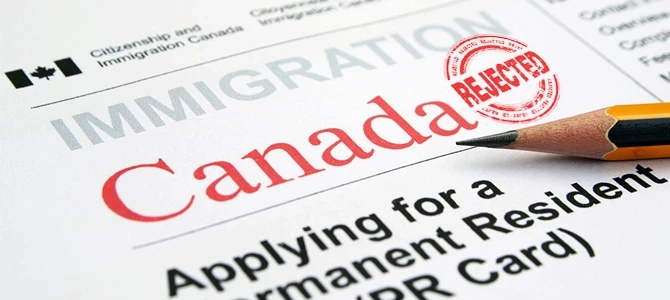In the past few years, Canada's PR application rejection rate has increased substantially. It is not uncommon for applicants to receive a rejection letter from one of the Canadian immigration authorities when they apply for PR. Even if it is not a pleasant experience, getting rejected for PR does not mean that your application has failed completely, and there is no way you can be accepted again. If you get denied for PR, it simply means that Immigration lawyers in Toronto reviewed your application, and they did not find it valid on some grounds. However, this doesn't mean that you cannot re-apply. Instead, it would be best if you understood the reasons behind the refusal first so as to apply again and make necessary changes to your new application.
1) Ineligibility
In Canada, there are many immigration programs, each with its own set of eligibility requirements, such as age, education level, work experience, and skill level. Your PR application may be denied if you do not meet the eligibility requirements or provide incorrect information. To determine which immigration programs will be a good fit for your qualifications, you should view the requirements for various immigration programs. It will increase your chances of approval since you will qualify as a PR visa applicant.
2) Insufficient documentation
In terms of immigration documentation, the Canadian Government is quite strict. Your Canadian immigration process begins with this step. Applicants receive a detailed checklist in their mailboxes, which they must follow based on the relevance of their documents. A document checklist should be prepared, and a complete document portfolio should be gathered in one place in order to avoid delays and errors. By doing so, you will be able to submit your documents within the deadline.
3) Inaccurate information
You may have misunderstood the instructions and provided inaccurate data when filling out the form. Check that the information you provide is accurate. A good example would be to state that you are employed when you aren't. Providing inaccurate information about your employment, assets, or other financial matters is not a good idea. It may be impossible for you to re-apply for a visa if you make a severe mistake on your application form.
4) Insufficiency of funds
Every applicant for a Canada PR visa must show that he has a certain amount of funds available to him to cover the purpose for which the visa is being sought. PR applicants must have sufficient funds to support themselves and their family members for a minimum of six months after arriving in Canada. A bank statement or bank certificate, such as a fixed deposit, is required to prove the funds. In order to enter Canada, the applicant must carry with him digital or documentary evidence of these funds. The authorities tend to reject applications if the applicant is unable to provide the required funds in the desired manner or in verification because the sources are unclear.
5) Not meeting deadlines
There is no doubt that immigrants must undergo multilayered verifications and checks to become citizens of Canada. CIC's policy is to set deadlines for document submission to ensure a smooth process. The most important thing is to adhere to their timeline. The applicant's poor performance is reflected in the delay in submitting the requested documents. When you fail to submit the required information in time, it implies that the information you provided initially was not authentic, and you are having difficulty defending yourself. If that were not the case, failing to meet deadlines shows irresponsible behavior and an unwillingness to follow through on your PR application.
6) Health concerns
The Canadian Government requires every PR applicant to submit a medical certificate or a good medical report. The goal is to make sure that, once you arrive in Canada, you do not burden the healthcare system financially or pose a health risk to Canadians. Applicants who do not meet health requirements will have their applications rejected.
7) Criminal Background
In the verification process, criminal background checks are included. To ensure that potential immigrants do not pose a threat to their communities, the Canadian Government requires clean records. It is necessary to provide a police verification certificate, but it is not proof that criminal behavior has not occurred in the past. In order to ensure the integrity of the background checks, the Embassy conducts them at multiple levels. Every country where you have resided for more than six months since you turned 18 will be contacted by the immigration authorities to verify your background. An immigration law firm in Ontario will assist you with the background checks for any verifications needed.
Conclusion
If you are denied PR, there is no need to panic. The chances of success for any future application will improve if you make changes to your existing application and re-apply with the appropriate supporting documents. The key to a successful application is to show that you are making an effort to improve and improve your chances of success the next time around. The main goal of a PR application is to provide permanent residence to skilled workers from other countries, and the requirements that apply to PR applications are meant to ensure that only eligible candidates are admitted to Canada. Now that you know what might have led to your Canada PR application being rejected, it's time to take action.
0
0


